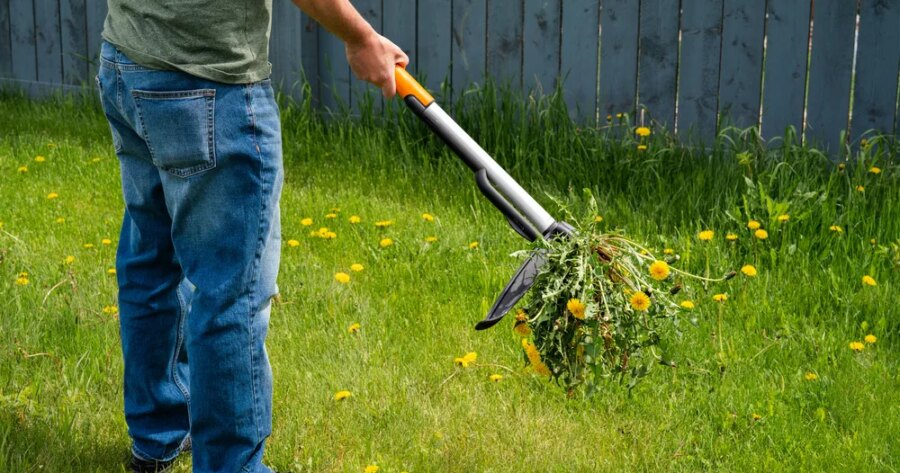A healthy lawn boosts curb appeal and creates a welcoming outdoor space. Achieving that lush, green grass requires more than just regular watering and mowing; it takes the right care and attention. Unfortunately, many homeowners unknowingly make mistakes that can hinder their lawn’s growth and beauty. From improper watering techniques to neglecting soil health, small missteps can lead to big problems. By understanding and avoiding these common mistakes, you can cultivate a thriving, vibrant lawn.
Overwatering or Underwatering
Watering your lawn seems simple, but it’s easy to get it wrong. Overwatering your grass can cause root rot and promote weed growth. Underwatering, on the other hand, leads to dry, patchy grass. The key is finding the right balance.
To avoid these problems, water your lawn deeply but less often. Most lawns only need about one inch of water per week, including rain. Water early in the morning to reduce evaporation and allow the grass to absorb moisture. Using a sprinkler timer can also help regulate watering.
If your lawn still shows signs of stress, such as yellowing grass or thinning patches, it might be time to call a lawn care professional. They can assess your lawn’s needs and provide tailored advice on irrigation.
Mowing Too Short
Cutting the grass too short is a mistake that many people make. While it may seem like a shortcut, mowing too low can damage your lawn by stressing the grass and exposing the soil to weeds and pests.
Instead, follow the one-third rule: never cut more than one-third of the grass blade at a time. This helps keep your grass strong and resilient. Additionally, vary your mowing patterns to avoid compacting the soil in the same areas week after week.
Ignoring Soil Health
The condition of the soil beneath your grass is just as important as the grass itself. Many homeowners focus solely on fertilizing and watering without considering the quality of the soil. Poor soil can prevent nutrients from reaching the roots, resulting in weak or unhealthy grass.
To maintain good soil health, test the pH level of your soil every few years. This can help you determine if your lawn needs lime or other treatments to balance its pH. Aerating the soil once a year also improves its ability to absorb water and nutrients.
Fertilizing at the Wrong Time
Fertilizing is essential for a healthy lawn, but timing matters. Applying fertilizer at the wrong time can do more harm than good. Fertilizing too early in the spring encourages fast growth, which may lead to weak roots. On the other hand, applying it too late can waste the nutrients, especially if your lawn is going dormant for winter.
The best time to fertilize depends on your grass type. Cool-season grasses benefit from fertilizing in the fall, while warm-season grasses thrive with early summer fertilization. A lawn care expert can recommend the ideal fertilizer and schedule based on your lawn’s unique needs.
Skipping Regular Maintenance
A common mistake is to treat lawn care as a one-time job. Healthy lawns require consistent attention, from mowing to watering to seasonal treatments. Neglecting routine care can quickly turn a vibrant lawn into a dull, patchy one.
To avoid this, create a simple maintenance schedule that covers essential tasks like mowing, watering, aerating, and fertilizing. If maintaining your lawn becomes too overwhelming or time-consuming, hiring a professional service for regular maintenance can save you time and help your lawn thrive year-round.
When to Call in the Experts
While many lawn care tasks can be handled on your own, there are times when calling a professional is the best option. If your lawn suffers from persistent issues like weeds, diseases, or poor growth, experts can diagnose the problem and offer solutions. They have the knowledge and tools to provide treatments that may be unavailable to homeowners.
In addition, if you’re unsure about the type of grass you have or how to care for it, a lawn care service can offer valuable advice. Professional services can also handle more complex tasks like pest control, soil testing, and large-scale lawn renovations.
Take Care of Your Lawn
Taking care of your lawn doesn’t have to be complicated, but avoiding common mistakes can make a big difference in the health of your grass. Whether it’s adjusting your watering schedule, mowing at the right height, or keeping your soil healthy, small changes can lead to noticeable improvements. If you’re ever in doubt or face bigger challenges, don’t hesitate to seek help from professional lawn care services.

